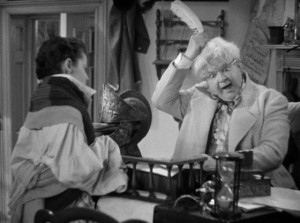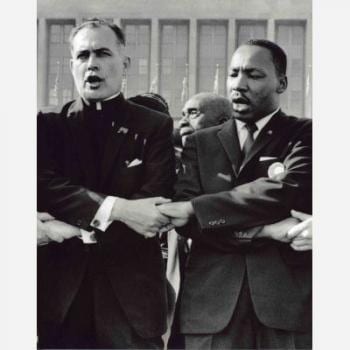 About four years ago I gave in to the temptation of speaking to a men’s retreat at my parish, the well-known Christ Renews His Parish program. I think of it as a temptation because it’s easy for me to want to parade my learning (such as it is), embellish episodes from my picaresque personal history, and promote myself as a regular pillar of sanctity.
About four years ago I gave in to the temptation of speaking to a men’s retreat at my parish, the well-known Christ Renews His Parish program. I think of it as a temptation because it’s easy for me to want to parade my learning (such as it is), embellish episodes from my picaresque personal history, and promote myself as a regular pillar of sanctity.
I gave my witness, as it’s called, near the end of the weekend. Afterwards one of the attendees, whom we’ll call Ralph, approached me to introduce himself. He explained apologetically that he had gotten a phone call just before I was to speak and missed the talk. But he wanted to hear what I had to say. Could we have coffee together next week? I agreed and so I began to know Ralph. He seemed to be a bright and good-natured guy, mid-fiftyish, bearded and slightly unkempt, whose conversation flashed around from topic to topic.
He apparently had not worked in over twenty years, his last position being as a sales guy in a high-end audio store. His biggest problem, he repeated endlessly, was simply that he had too many great ideas, all of which the world needed badly and soon. After he described a few of his personal attempts to reach the CEOs of Radio Shack, WalMart and J.P. Morgan Chase, I realized the extent of his illness. He had a way of comparing himself to Nicola Tesla and Buckminster Fuller.
It turned out that Ralph’s family kept a certain distance from him as his condition–some form of depression, I assumed–worsened. When I first met him, the walls of his one-bedroom–a monument to hoarding, especially of obsolete electronics equipment–were sprinkled with sticky notes reminding him to “drink more water,” “go for walk,” and so on. On a couple of occasions, he called to say he was having “bad thoughts” and needed a ride to an E.R. room. On our first such visit, I walked into the reception area with him and noticed that he was immediately greeted by name by the staff who happened to be on duty. He was a “regular” in E.R. rooms all around our area, it turned out. At one point he was calling the V.A.’s telephone counseling line almost daily, talking for hours and hours, until he finally admitted he was not in fact a veteran and they asked him to desist.
I befriended Ralph without quite thinking about it, as I felt he had simply been sent to me somehow. “Why are you my friend” he asked me several times. “Everybody else has given up on me.” I had a hard time saying exactly why, so I simply joked, “Because you’re so entertaining,” a kind of half-truth. (“I talked to Jamie Dimon’s office again today at J.P. Morgan,” he might begin a phone call to me, referring to his uncanny ability to penetrate the executive offices of top companies and then engage some patient and hapless admin person with his bizarre chatter.)
His disease seemed to work in long cycles, so that gradually over time he would join various support groups, help out with small volunteer projects, all the while talking to me of his “company” and his CEO responsibilities, chief of which was to divest himself of all the brilliant ideas so that they would no longer clutter his mind. (He had legal pads filled with pages and pages of the latter ideas, almost all of them simply passing notions–“put together one billion dollars with some friends and buy Radio Shack while the door is open!”, etc.)
Ralph was the first such relatively high-functioning yet mentally impaired person I had known well. At first, I reacted to his grandiosity and delusional statements by attempting to make him face reality–as had many of his former friends who no longer had any patience with him. The result was not good: he would become upset, mildly angry, and unable to continue a conversation.
I spoke with his doctors, his therapists, a family member or two. They all saw him as more or less unmanageable but not yet a desperate case. For some time I wondered whether I was really being much of a friend. After all, my efforts to help Ralph were not moving toward some kind of “cure,” whereby he could return to the working world of middle-class competent adults. (Ralph explained he knew a little about surfing the Internet but had never learned to use email.)
Although he was very social in his manner, I thought Ralph’s principal complaint really amounted to loneliness. He needed the companionship and support of a group home, especially during his down cycles. In our state, unfortunately, there seem to be few if any such programs. But I also sensed that the perfect blend of medication, therapy–the usual stuff–probably didn’t exist for him. Ralph’s condition came to remind me of a character in Dickens’ David Copperfield, the gently daft but harmless Mr. Dick (the image above shows him as portrayed by Lennox Pawle in the 1935 George Cukor film), living with David’s Aunt Betsey in her cottage at Dover after she rescued him from a harsh asylum. No one pays much attention to his dotty preoccupation with the decapitation of King Charles or his kite-making: he’s a full member of the family and becomes a great friend to the novel’s hero, offering odd bits of insight at moments.
We readers of Ivan Illich are likely to feel Mr. Dick’s life circumstances–unmedicated as they may be–allow for much greater happiness than our modern therapeutic approach. And frankly I don’t know how to “cure” Ralph. But I’m happy for his friendship.












